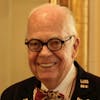How To Use Music To Elevate Your Guest Experience - Clay Bassford, Bespoke Sound

How can you use music to elevate your guest experience and set your brand apart? I can't think of someone better suited to answer that question than our guest today, Clay Bassford, founder of Bespoke Sound.
Clay and his team created the new sonic identity for Hospitality Daily that you hear on this show now, and he's helped countless other leading hospitality providers use music and sound to differentiate their brands and delight their guests.
In this episode, you'll get a behind-the-scenes look at how this process works and get inspired by what this could look like for you and how you provide hospitality.
- Follow Clay on LinkedIn
- Learn more about Bespoke Sound
- Follow Bespoke Sound on Spotify, and check out some of my favorite playlists:
Join in the conversation on this episode on the Hospitality Daily LinkedIn page here.
This episode is brought to you with support from Actabl. Discover the power of actionable insights with the software company dedicated to meeting the evolving needs of leading hospitality businesses. Actabl's suite of leading solutions, including ProfitSword's AI-powered business intelligence, Hotel Effectiveness' labor optimization, ALICE's operations management, and Transcendent's asset management, harmonize data, work, and people seamlessly. By hoteliers for hoteliers, Actabl is the key to elevating profits and guest experiences. Explore the possibilities at actabl.com and unlock the potential of your hospitality business today.
Music by Clay Bassford of Bespoke Sound: Music Identity Design for Hospitality Brands
Josiah: I have to share a little bit of a personal story because before you and I got dinner in L.A., it was, I don't know, my 15th, 20th trip to L.A. and I never quite connected with the city, right? So I was like, a lot of people love L.A. I just need to crack the code and never quite did it. And then I pulled up one of the great playlists you have on Spotify. I'll link to it in the show notes, some of the playlists that you create. We may touch on this later in our conversation, but you're very generous with kind of sharing your music, what you've found as a way to help people understand what music can do for you. I share this just to say that as I was driving through LA, which took a fair amount of time, I was able to go through so much music that brought me into the zone. I felt that sense of place. I felt like I'm really excited to be here. It reminded me the power of music. I guess I'd love to hear you tell us a little bit more about Bespoke Sound. What is the music identity studio? What do you do?
Clay: Yeah, that anecdote brought back so many memories for me. I mean, I think we've all had powerful experiences where we're in a new place or exploring a place we thought we were familiar with and noticing something new about it, and there happens to be a song playing that time, maybe on the radio or you're listening to your own music, and then you forever make that association with that place and that time and that song. And I think that kind of very impactful impression is a window into kind of how we think about our work at Bespoke Sound, which is using music as a way to foster an authentic and deeper connection with other people or to foster their connection with a place that these visionaries have created from the ground up. Every piece is considered, and music is just another part of that piece. I think we very often overlook the nuance of experience and all the little components that go into it. Really, we've found, we believe, our hypothesis starting the business and we found proven true over and over again is how uniquely powerful music can be in shaping an experience in a really meaningful and authentic way. I hate to use the words authentic and meaningful so much, But music is unique in how authentic and meaningful it can be. So I will use it for that. Taking some steps back, I think that's sort of our more creative, maybe, our philosophy behind what we're doing. Were you interested in learning more about like how it started as a kind of background story or?
Josiah: I'd love if we could get into that. And I wonder if we approach it maybe starting with your own career journey and some of the things that you observed, you know, living in Europe, working in Europe, you've spent a lot of time in and around hospitality from so many different angles. But tell us a little bit about, you know, your journey and what led to you founding this company.
Clay: Yeah. So I think at the very foundation of it is my being a passionate music lover and fan musician. I've always enjoyed finding new music and digging a little further to explore different genres, styles, and eras and learning about the different circumstances that led to an artist having a certain moment of inspiration, the background and why music was developed one way or another way. So that's my foundation. I played music since I was 13. That red guitar in the back over there is the very first guitar that I ever had. So that's the inspiration and where the passion comes from. Alongside that, I had a varied career in hopes of supporting making music. I worked as a copywriter for startups in New York. I worked as a music journalist. I worked for a hospitality technology startup in Berlin. I also worked for the Danish Tourism Board. Alongside all of these jobs, I was doing music. So it was two passions, one for travel and one for community, and another for music and making music. So maybe 13, 14 years ago now, I fell into my first gig through a friend of a friend who owned a hotel and was looking for someone to help him with music. It was his family's passion project. They all loved music deeply but just didn't have the time to be constantly making playlists for this property. And so I was introduced to this gentleman. And luckily, my friends thought at my age, I was responsible enough that I wouldn't embarrass her. And so she introduced us, we hit it off, we had similar tastes. And I would just fly down to this place with an iPod full of music every year and hang out and After the first experience doing that, it was so rewarding. I got to share music that I was really passionate about with people who are here to have this on property, to have this memorable experience and experience the space to the fullest, and I was helping facilitate that. I could watch people enjoy the music and they shazam the song, this is so cool. I was like, wow, I get to work with music, I get to travel, I get to create these memorable experiences, shape these experiences for people, it's everything. I want to do. So I did that on the side of these other jobs that I mentioned, learning more about the hotel space and the hospitality space, trying to understand from a more closer perspective how hoteliers think, how hospitality business owners think, and what's important to them so that I could offer something that was of value and not just my favorite songs. play these in your place and you're good to go. You know, it's about understanding what's appropriate for the space. And that's evolved to a whole different level is still a part of our philosophy today. But taking a couple steps back to doing that on the side, just my luck a year before the pandemic, I decided to jump fully into it. start with a new business structure where it was more of a collective of creatives from all over the world rather than just me curating the music and offer this access to this network of musicians and DJs that I had met throughout the years of working in that side of things. and really create this community of creatives who can offer something special and unique and brand appropriate to these businesses that would help them differentiate their experience in a way that, as I mentioned, music is uniquely positioned to do. pandemic hit, it turned out to not be so bad. It was a scary first six months. And then from that point onwards, businesses, hospitality businesses, especially, you know, the resorts and boutique hotels that we were starting to work with started to reopen. And We've been growing at a very healthy pace ever since. So it's been about, yeah, four years now. And I'm really excited to be here talking to you today. Yet another awesome mark in the achievement calendar, let's say.
Josiah: Well, it's really exciting for me to hear that story and to see some of your work with some of the best hospitality brands and providers in the world. Right here in the San Francisco area, Stanly Ranch, you're just winning award after award. And you are a big part of the experience that guests are paying thousands of dollars per night to experience. So it's just amazing to see that. You mentioned one thing earlier that kind of caught my attention, and that is the attentiveness that you had for owners or developers or brand leaders, that you were listening to their needs and not just saying, here's music I enjoy. Could you speak a little bit more to those needs or those business outcomes that the leaders that you're partnering with are expressing and how you're thinking about addressing that?
Clay: Absolutely. In my experience, that was something I noticed very early on when I was trying to understand this little corner of creative service provider industry that I find myself in. I think not to go on too far of a tangent, but I think the way we value music as a culture has impacted the way music is experienced in the hospitality space. By that, I mean, we're used to having access to every song we want at the click of a button for $10 a month or $15 a month, whatever it is these days. So people expect music to be free and available. Running a business is not a cheap endeavor in most cases. So there's this conflict between expectation for what's possible with music at a consumer level and what's possible also financially with music to meet business needs. And so we've seen the music provider corner of the world in a race to the bottom, more or less. And the larger providers out there are just trying to beat each other on cost. I won't speak to quality one way or another, but it seems like, you know, understandably, people need to meet a budget. And so they have certain cost expectations in mind. But if you're a music provider, you're trying to meet those cost expectations. you have to streamline and you have to offer a pared down service. And sometimes that comes at the expense of attention to detail or quality of service or just overall intentionality behind the service you're providing to that business. If you're serving 6,000 locations or 1,000 locations, you can't give them the same attention to detail that you could if you're serving, you know, a brand that has 10 or 20 or one location. So instead of trying to compete with these international and mega corporations on price, we're trying to compete in quality and service and be very intentional with what we're doing. And the clients that we're lucky enough to work with seem to really appreciate that, you know, we put a little extra effort into. being there for them when they need support, and adjusting music as they need it, and trying to really internalize their visions in a way that makes them excited. In the way that their guests are excited, they hear a song and they're like, yes, this is what I want to hear in this space. Hopefully, their guests feel that way too, and we feel that way too, and that's what it's all about. In terms of kind of what grand leaders or business owners or, you know, GMs, whoever it might be, what they're looking for at a human level, you know, it's to be understood and to help them accomplish their vision. It may work out in another provider's case. Let's say someone's working with like an independent DJ. There are many out there who do this similar service to what we offer. to hotels. It may work out that that DJ's taste or skill set happens to match with that hotel's or hospitality business's requirements, but it may not. And quite often, you know, we're all limited by our own skill sets. And so, we try to bring different people in with different areas of expertise to match what our clients need. So, it's not We use this anecdote once in a while, but you know, so it's not a couple of white guys in California saying what sounds right in Singapore or Cape Town or even New York City or, you know, areas we might be more familiar with. And then that kind of brings me to another point of representation. And so we, along with aiming to provide a better creative service and a better level of client service, We want to take care of artists as a musician myself, everybody on our team are musicians and DJs. We're here to make sure that artists are taken care of and are paid appropriately and that their work is appreciated because we appreciate their work and ultimately our clients appreciate their work. So being respectful of the communities that we work in from a cultural perspective is really important. Working with artists from different places that represent those regions is very important.
Josiah: So you're thinking about this very holistically and you're partnering with hospitality providers to extend their vision, extend their brand. It's interesting you mentioned some of the, you know, kind of broad cultural trends around over the past couple of decades, maybe people's expectations for, you know, some music has declined and they think everything's free when actually there's a lot that goes into this if you want to do it well. But I guess I want to maybe kind of touch on maybe the other side of that coin, especially recording this in 2023. Beyonce had a big tour the summer and into the fall. Taylor Swift, of course, had an incredible tour and a lot's been written about the impact of that on many levels, including on travel, it does seem that people are also willing to pay for experience in music being an integral part of that experience. I'm curious if that's entered some of the conversations or the thought of some of the people that you're speaking to as well. Do you see that as a cultural thing happening right now at the same time?
Clay: Yeah, I think something that we've all seen in the past, especially a few years as I've been growing my business, watching the industry, watching the hotel space, the amount of, let's say intentionally or trying not to categorize, but I'm just going to do it because it's more descriptive. There are more boutique luxury and lifestyle hotels than there ever have been. and the space is incredibly competitive. And if we think about why guests choose to stay in these spaces and these properties over Airbnb or over a more, say, corporate offering, It's because of the experience, because they want to get a taste of the lifestyle, of the atmosphere, the way of living that's offered in this space. And really the visionaries behind these properties, the owners or the developers and the team that helps make it happen, it's about sharing this ideal way of life with their guests. And so if it becomes more competitive, if you have, say in a city break property, you have a handful of competitors within the same within walking distance, how do you really differentiate what you're doing? Of course, you've got the interior design, you've got F&B offerings. Music is an obvious way to do that. And in terms of the investment, you'd make an interior design to differentiate your space from another. It's a fraction of that to invest in really quality music. And it can extend to different parts of the guest experience too. So our main offering is the music that you hear in spaces. We like to call it atmospheric music. We don't think it should always be in the background. Many times it is, but it's not always background music as it's often called or elevator music. Elevator music shouldn't exist in the lobby. But there are other ways you can use music too. So we're talking about performances and the zeitgeist around this Taylor Swift tour, which makes hundreds of millions of dollars for a city in a weekend. I mean, cities petitioned for her to come to visit. because they know what a boost in revenue will be. If that's not an example of like, you know, just pare that down to even a tiny 1% of what she's doing in a night, that's a lot for a business to make. Music can influence that. There are studies that have shown that playing on-brand music in a space can boost F&B sales by 9.6%. So let's say you play an amazing soundtrack in your restaurant that could be thousands of dollars a night that you're earning because people choose to hang out and buy another drink or stay for dessert or go to the bar next door. You know, there's lots of examples like that where music impacts business in a positive way.
Josiah: I appreciate you getting into that because I mean, just on that point, I would like people to think very holistically about their brand, their operation. And I think a lot of people might, they know F&B is important, but they might actually not be taking it as seriously as they could be. I was talking to the CEO of Generator and Prehand Hotels, and they said, you know, one of their locations, they're making $3 million in their accommodation business and $7 million on the food and beverage side. So it's actually like there's this potential. And then he said that that offering then differentiates their brand. It makes people want to stay there. So like this actually, I know we're talking about like a very slim part of hospitality, but actually might be like a big opportunity there. And then you think about music being an accelerant of this thing that could be really, really important. It's just one of the benefits of investing and thinking this way.
Clay: Oh yeah, we see a lot of our clients in this boutique luxury lifestyle space focusing a lot on their F&B offerings. I love what Freehand does, by the way, they have amazing food and beverage offerings. I think that's a great example and it becomes a draw for the locals. I, you know, go to the Freehand here in LA for a drink or for a bite to eat often because it's a great space and it's a great atmosphere. Yeah, I really encourage people looking into that.
Josiah: I wonder if, you know, we kind of talked about Song Exploder and kind of going behind the scenes early in our conversation. And I wonder if you could kind of walk us through the process of maybe a recent client project, just to give people a sense of kind of what this includes. Does one come to mind that you enjoyed and is sort of representative of how you work with people to develop these experiences in these programs?
Clay: Yeah, one immediately comes to mind, which is Blue Lagoon in Iceland, who we'll be launching with in a few weeks time. And the way we work together on their project is kind of our standard process, which is approaching the work kind of more like a creative agency would or a branding agency. So the goal is to really understand and internalize the brand. What is the story? Who are the guests? What are the guests' activities on site? What are they doing? What are their expectations for activities and for service? What is the local cultural context? not only like what country are we talking about, but what city, what neighborhood, rural, urban, resort, city break, you know, getting away for wellness or for romance or for business or family time. There are all of these variables that influence the way an experience should be built. So we try to get to know that. And so we went through a process with the team at Blue Lagoon to understand who their guests are. And they gave us this amazing documentation they had just done or recently done a big kind of persona project where they identified the key personas of their guests. And they had five different types and each type was coming for something a little different than the other. And so the challenge became, how do we cater to all of these personas and their expectations and the activities that they want to do? while still making it feel like a cohesive experience where we have something to say or the message is salient. And so we started thinking about the balance between wellness and adventure, which is kind of two core components that guests go to Blue Lagoon in Iceland for. Some want to enjoy the famous spas and thermal baths they have. Others want to go out and do hiking or see volcanoes or see the coastline. And so we started to define how those desires reveal themselves in different spaces, in different times of day, and for different guests. And so obviously a spa space lends itself towards a wellness approach, whereas a restaurant space depending on the space, may be much more convivial and social. And so people are wanting to come together after a day out hiking and, you know, share stories. They have a coffee service in the afternoon after guests have checked in. Most guests check in at the same time with shuttles coming to the property. So it's a little bit off the beaten path. So they'll have a coffee service where they have the staff and newly arrived guests hang out and have a coffee together. So it's really important to them that we have music during that coffee service that facilitates that social atmosphere, makes everyone feel really at home and welcome and comfortable talking to two strangers from another part of the world and making these really strong bonds of community. And so that's a little peek into the process. From there, once we feel like we have a solid understanding of the brand's goals with music, we create a sonic identity guide. So it's a lot like a brand deck would be. And this guide outlines what we've learned. What do we understand the brand to be and their guests to be? This is just making sure we're on the same page to begin with. Then we look at guest activities, experiential expectations, and ways to potentially leverage music to enhance those experiences. Then we go a bit further and we look at musical archetypes that represent those enhancements. So we will come up with concepts around music that can be representative of wellness or adventure in this example. They had a few other concepts, but just to simplify, there are those two. Then from there, we drill down even further. We look at the different zones, as we call them, or spaces or groups of spaces that have a certain musical environment. What is the music like throughout the day? What is the energy flow throughout the day? How do we mix and match these different sonic archetypes or musical concepts that we've identified for the brand? Then we give that to the brand along with some suggestions of how to apply this if they're working on another music project where we're not involved, or how they would apply it in projects that we are involved in. Then we get to work building out all this massive amount of music that you hear in these different spaces at different times of day, setting it up in our system from a technical perspective, getting them up and running. Then once we launch, it's about refinement, adjustments, making regular updates, making sure the music is all licensed, continues to be licensed for commercial use, and then really being an active partner. So we see ourselves as a music director that you don't have to have on staff. So kind of a music director as a service maybe.
Josiah: That's great. And it allows them to, you know, work with the best in the world. And I think, you know, if I look at some of the very best hospitality providers, you know, you're working with them, whether it's, you know, this project or Stanly Ranch. And I think how you're thinking holistically, it's a very thoughtful process. And so the end result kind of speaks for itself. We can link to some examples on the show notes. But I think, you know, also you're thinking beyond the scope of how some might think of music. And so with Stanly Ranch, my understanding is, you may have done this elsewhere, but with Stanly Ranch, you kind of help them create these public Spotify playlists that almost help people before they arrive. Maybe you're on the plane, maybe you're on your way to the resort or you're leaving it. It helps people get in a state of mind and feel connected to the brand in a way that before they're even on property, which I think is such an opportunity.
Clay: Yeah. I mean, I know from my experience working at a hospitality technology company, how important it is to try to extend the guest experience before and after stay from a digital perspective. And so Stanly Ranch is a great example because we've done that. gone wider and deeper in a few ways with them. The example you mentioned is something we recommend to all of our clients, almost all of them, do something along these lines, but that is creating Spotify playlists that are little snapshots of the music that you have on site. and arrival departure playlists are some of the most common ones that we do. It's a great way for guests to experience the experience you're offering for and after the stay on their drive from the airport, on their flight in even, on their way back to the airport. It's something they can take home with them and listen to it on a random Saturday morning when they're cleaning the house. They're like, I wish I was back in Napa having a glass of wine again. And that's, you know, beyond the arrival departure playlist concept. I think there's a way to extend the guest experience or at least the brand connection beyond the stay with these playlists as well. You can send them out in confirmation emails. You can send them out just on social media, post the playlist to your brand's Instagram story and remind your guests that you're around and you have this great experience for them to enjoy. And here's a little snapshot of it. that can then be extended to the music that you use in your digital marketing ads. So if you're doing reels or you're doing ads on Instagram, whatever it might be, the music there should be in line with the music that your guests hear on site. And that's something that I think more brands are coming around to. We've had a lot of interest in that area lately. And it's just as important as we start to think about all the different touch points that guests or future guests or past guests have with the brand.
Josiah: I kind of underscore the point you made because I think this is one of the biggest opportunities. I was talking to Dorothy Dowling, who is the chief marketing officer of Best Western International, oversaw 18 brands, and she said one of the biggest challenges in branding and hospitality today as compared to other industries is you have so many fewer touch points, right? And so she recalled talking with an executive at Apple who was saying people are opening up Apple Music six times a day, every day, and there's this constant interaction. And Dorothy was saying, okay, well, in the hospitality, it's tough because even our most frequent guests are not with us every day or multiple times a day. And so if I hear what one of the best marketing leaders in the world was saying and what I'm hearing from you, it seems there's an opportunity here, right, to stay top of mind, to build that connection, to build that emotional link with people.
Clay: I mean, I think maybe one of the hesitations I could imagine about around leveraging Spotify for as part of your digital marketing campaign, if you're a hotel hotelier is that there's not a lot of interaction. You can't really measure engagement. You know, you can see who likes your playlist or how many people like it, but that's about it. But at the same time, you know, you're talking about how often people open the Apple music app. I wonder how many times a guest opens a hotel app, you know? You want to meet them where they are. That's kind of digital marketing 101, at least one of the first things that I learned. And so if someone's opening an app six times a day, how can you be there? Well, you make a playlist and you share it with them and, you know, make it a good one so they like it. And then they'll think of you more often and you've got the wheel spinning. So I think it's a really low effort, low cost thing to do that develops kind of brand impact in a strong way. One other thing I wanted to mention using Stanly Ranch as an example is the idea of using performances or live music as a way to grow the guest experience and differentiate the guest experience. At Stanly Ranch, we do a series of performances called patio sessions. These are local Bay Area artists who come and play in the patio between their different F&B spaces on a weekly basis, every Saturday afternoon while it's warm out. We've had a really great community grow around that where we have these really fantastic artists performing, and locals and guests will come by to hear the music and have lunch or hang out, have a cup of coffee. And it's created this really nice activation for the team to share on social media as well. So it creates this kind of ecosystem where we've got the team and guests and locals and artists all sharing this experience and reinforcing the experience together. And that's really the seeds of community, you know, building community. So that's something that's also maybe a little more familiar to a lot of listeners, but something that's worth considering. And, you know, just like every business needs its own kind of music, every business needs to figure out what's appropriate for them. Is it a DJ or a live band? Maybe some spaces, live music is not appropriate, but it also has the potential to do a lot for a business and bring people in, bring locals in, especially who can spend more money in your F&B office.
Josiah: Oh, that's great. Brings more people in, differentiates your brand. And I think actually you touched on something that some people may be overlooking is, but is that employee experience as well? How does it feel to work in your business? Right. And I feel that's something I'm starting to hear people talk a little bit more about because there's such a potential in this environment with really hard to hire good people. If you have a really great place, that's a fun experience, you know, that makes it more likely to attract the best talent.
Clay: to mention that often we'll be talking with prospective clients or clients before their clients, and they're talking about the challenges they have with music. One of the most common ones, and it's often said jokingly, but I think is just because they feel stuck is their staff is so tired of hearing the same song after the same song every day. One song plays and they know, all right, this one's coming up next. I don't know if you've ever had the experience of working on the service side of things, can drive you crazy. So having variety in music is such a small part in terms of operations on a team side of things, on an internal side of things, but can make such a huge difference to team satisfaction. So I just want to make that quick point.
Josiah: Yeah, and everyone listening should think about this, you know, how do you create a great experience for guests, also for your team as well, right? It's really important. I guess as we look into the year and years ahead, Clay, who would you like to work with? Is there a type of hospitality provider that might be listening to this that you think what you offer would be a great fit for? I'm curious who comes to mind and I want to encourage people listening to reach out to you if they might fit this description.
Clay: Yeah, we have the privilege already of working with some fantastic brands. I'm really happy with who we're able to work with and really grateful with the brands that we currently work with. One thing that comes to mind is just a couple months ago now, we had the pleasure of being asked by the wonderful people at Design Hotels to do the music for their annual conference. Business had been around for a bunch of years, so it was a big celebration to host it back in Berlin, where Design Hotels is headquartered. We went there and met so many fantastic people. It was really a dream come true from a business perspective because that's who we dream of working with. You know, business owners who are visionaries, as I've been saying, people who really care about the guest experience and have put a lot of intention and thought into creating a unique and sophisticated experience in terms of detail and quality. We don't think so much about size as much as we used to. When we started out, we were like we want to work with small independent hotels, maybe small groups because they're the only ones who can really focus as much. But we haven't found that to be the case in terms of delivering such a quality experience. So now we're working with brands of different sizes, groups, still individual properties. But yeah, I think that sort of intentionality and creative vision is where we find the most alignment.
Josiah: I love it. Well, I encourage everyone watching this listening to check out Bespoke Sound. I will link to your website, your social media profiles, your Spotify playlist. Do yourself a favor and subscribe to those and listen to some of the great music. But I encourage you to reach out to Clay and his team if you're looking for a way to up-level your guest experience, as a way to better engage your staff, as a way to differentiate and stand out. You got a little taste of what Clay can do when you heard the intro to this episode. But he's such a talented guy and such a talented team. So, Clay, thank you so much for taking some time to join us today.
Clay: Oh, my pleasure. Thank you so much, Josiah.
Most Popular Episodes
Check these out:


























